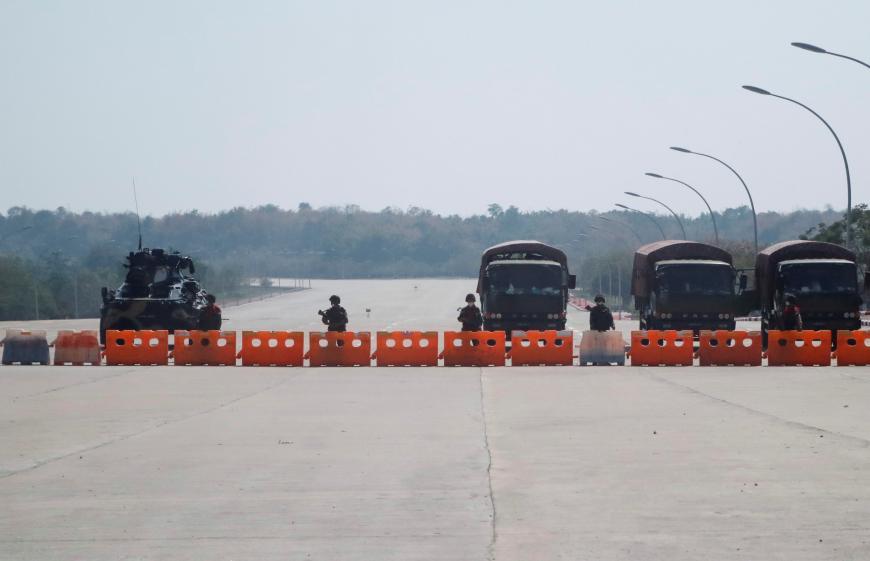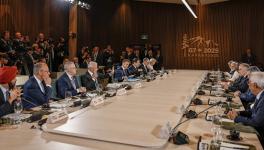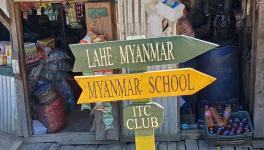Why Myanmar Matters

Image Courtesy: Reuters
“Forget that my net worth / Is hardly worth mentioning, / Forget the President’s name, / Forget Daw Aung San Suu Kyi.”
“Forget politics. / Yes, yes, I’ve already forgotten. / Forgotten everything! / Have I got democracy now?” Khin Aung Aye (b. 1956)
On 1 February, the Myanmar military staged a coup and did not allow the newly-elected members of Parliament to form a government, placed Daw Aung San Suu Kyi under house arrest, and shut down five media houses.
And so Myanmar is under military rule just when it seemed the country would actually transition to democratic, civil rule.
Aung San Suu Kyi had risked her reputation by not condemning the genocide of the Rohingyas. She had suffered international condemnation for defending the military before the International Court of Justice in 2019. She had done this, at least in part, because she did not want to give the military any excuse to take over. She knew that the military had the backing of a section of the Buddhist monks.
This time the Buddhist monks, a powerful political force in Myanmar, have not come out in the streets in support of the protesters. In fact, a few days before the military coup in Myanmar, nationalist Buddhist monks demonstrated in support of the army, known as the Tatmadaw.
A significant section of them seems to support the claims of election fraud that the military have cited as the pretext for seizing power and overthrowing Aung San Suu Kyi’s democratically-elected government. Other slogans on the banners carried by the monks proclaimed the Tatmadaw as a “protector of the state”.
But now it is clear that the Tatmadaw, the army which General Aung San raised to fight imperialism has turned on the people. From now on, the battle is not between Suu Kyi and her party, the National League for Democracy, but between all the peoples of Myanmar against the Tatmadaw and also against the conservative and rabidly nationalist monks who have supported the genocide against the Rohingyas who are Muslim.
This time the brutality of the Myanmar Army is unrestrained. They have unleashed violent attacks against thousands of young people pouring out into the streets across the country singing their songs, shouting slogans, and giving their three-finger salutes which symbolise the demand for democracy.
Hundreds of youth, including poets, writers, teachers, journalists, and bloggers have been arrested; many hundreds have been shot dead by snipers placed by the military on rooftops. But none of this violence has stopped the protests and there is no lack of courage and bravery.
There is now a long history of resistance and I have had the privilege to see it up close.
When I heard of the military coup in Myanmar my thoughts immediately went to Soe Myint, the CEO of Mizzima Media. He was just a student when Aung San Suu Kyi was first put under house arrest in 1989. At the time, he and a friend had decided to hijack a Thai Airways flight in November 1990 to get global attention to focus on the plight of their people and the detention of their leader.
They knew that they could well spend the rest of their life in jail but they had hijacked the plane and forced it to land in Calcutta [now Kolkata]. Their only demand was to be allowed to have a press conference. It seems impossible that two students should risk going to jail in a foreign country just to have a news conference...
Soe Myint came to India in November 1990 and spent 15 years in exile here. He did not opt to take refuge in the West and made India the base for his Mizzima News, and when Myanmar began to return to democracy he returned to his country. Mizzima was the first exile-based media house to return. Just when he was hoping his country would become a real democracy, the military staged a coup and on the first day of the coup revoked the Mizzima TV license.
By the time the soldiers entered the Mizzima office, the journalists had left with much of their equipment and gone into hiding. Mizzima is scattered but has continued to broadcast from 6 am to midnight from various hideouts. They are active on social media and continue their work as at least two of the journalists have been arrested and imprisoned by the military.
Now Soe Myint is hoping India will stand with the democratic forces in his country. After all, just two years ago, in 2019, Prasar Bharati signed a contract with Mizzima to share content and extended all help to Mizzima by offering free rights to broadcast Hindi movies with Burmese subtitles.
But the Indian government’s agenda was to strengthen the alliance between Hindu India and Buddhist Burma; it was not an alliance to strengthen democracy in the region. But what choice do the Burmese have in their fight against the military rule? They have seen how the West betrayed Aung San Suu Kyi when there were calls to take back her Nobel prize; China has been supporting the Burmese military and now they turn towards India and Indians for support.
From his hiding place, Soe sent this appeal to Indians: “India is a friend of Burmese peoples. India always stood with the people who are fighting for freedom and liberty. India has supported particularly Mizzima and ourselves when we were in exile in 1988-2012. We need immediate support from India. India should recognise the Committee Representing Pyidaungsu Hluttaw (CRPH), which is a legitimate representative body of elected members of parliament. India’s role is very important, particularly because China is not acting as a friend of Myanmar. China is supporting the military junta. India should work with other democracies in the region and in the world to pressurize the Myanmar military to go back to barracks.”
However, the government of India has once again decided to support the military rule in Myanmar and this time the government is not even willing to allow the Burmese to take refuge in India as they did in 1990.
The Ministry of Home Affairs has issued a letter dated 10 March to the four Northeast states bordering Myanmar, stating: “As you are aware, there is a probability of large-scale illegal influx into Indian territory through IMB (India-Myanmar border) due to current internal situation in Myanmar. In this regard, MHA has already issued an advisory Dated 25.02.2021 to Chief Secretaries of Mizoram, Nagaland, Manipur and Arunachal Pradesh and also to Border Guarding Force (BGF) along IMB (Assam Rifles) to stay, alert and take appropriate action to prevent a possible influx into Indian territory.”
But the people and state governments in the Northeast are reluctant to push back the refugees. The MLA from Mizoram has told Parliament that 300 Myanmar nationals have crossed into Mizoram and taken refuge.
The Chief Minister of Mizoram, Zoramthanga, has urged the Centre not to send back the Burmese who have crossed into India. People in Nagaland and Manipur have held meetings and candlelight vigils to show their solidarity with the peoples of Myanmar. Apart from humanitarian reasons for this resistance to the Centre’s directive the people across the border are from the same ethnic communities and have familial ties with people in India.
The directive of the Ministry of Home Affairs seeks to halt the flow of “illegal migrants” but the Burmese wanting to take refuge in India are not migrants at all; they are political refugees who want political asylum. India has still to sign the International Convention on Refugees and it has no domestic law for refugee protection. However, over the years, the Supreme Court of India and Gauhati High Court have passed several judgments recognising the right of foreigners to seek the protection of the United Nations High Commission for Refugees (UNHCR) in Delhi.
The military coup in Myanmar is an event that has political significance not only for the peoples of Myanmar and neighbouring India’s Northeast region but for India and Indians as a whole.
First of all, the India-Myanmar international border is 1,468 kilometers long and runs from the tripoint with China in the north to the tripoint with Bangladesh in the south. This is possibly the most geopolitically sensitive part of our border because it is an international border that divides Myanmar from four Northeast states of India: Nagaland, Manipur, Mizoram, and Arunachal Pradesh. Second, this is the region that has seen a growing number of insurgencies and ethnic conflicts. None of the peace processes, with the possible exception of the Mizo Peace Accord, have been successful.
Third, the China factor is ever-present in the region. The Burmese people are looking to India for support. Soe Myint told me in an interview on 21 March 2021: “China is supporting the military coup politically and materially. China wants to make sure the Burmese military protects its interests including various projects and BRI-related projects.”
A Free Movement Regime (FMR) exists between India and Myanmar under which every member of the hill tribes, who is either a citizen of India or a citizen of Myanmar and who is resident of any area within 16 kilometers on either side of the Indo-Myanmar Border (IMB) can cross the border with a border pass (with one-year validity) issued by the competent authority and can stay up to two weeks per visit. But trade has been suspended due to Covid and now the Indian government is all set to militarise the border.
There has been some talk about raising an Indo-Myanmar Border Force (IMBF). The Ministry of Home Affairs has proposed to split and merge 25 battalions of the Assam Rifles with ITBP and the rest of the 21 with the army. The Ministry of Defence is unhappy with the Home Ministry’s proposal to break up the Assam Rifles and divide manpower between ITBP and the Army.
The military coup in Myanmar will only strengthen the authoritarian forces in the region. In such a situation, it is a matter of utmost urgency that Indian and Burmese people, cutting across religious and ethnic divides, join and fight for real democracy in the region. International solidarity must become a part of the struggles for democracy in both India and Myanmar.
The author is a human rights lawyer, teacher, campaigner, and writer. The views are personal.
Get the latest reports & analysis with people's perspective on Protests, movements & deep analytical videos, discussions of the current affairs in your Telegram app. Subscribe to NewsClick's Telegram channel & get Real-Time updates on stories, as they get published on our website.
























